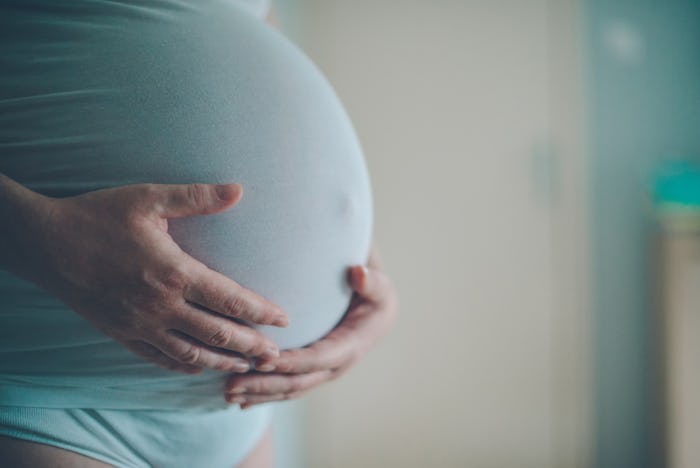Life

8 Things Every Expectant Mom Should Know About Abdominal Pain During Pregnancy
One of the best parts of pregnancy, in my opinion, is getting a 9-month reprieve from your period. If you're someone with chronic pre-menstrual syndrome (PMS) like me, it's even more of a plus. That is, until you realize that pregnancy is its own little horror show of nausea, heartburn, backache, and cramps. Some cramping is to be expected during pregnancy, but it can be anywhere from uncomfortable to downright painful, not to mention scary. That's why every expectant mom should educate herself about abdominal pain during pregnancy.
I didn't have abdominal cramping with my daughter. At least, not that I can remember. Or maybe it's that since I had a miscarriage in between her and my current pregnancy, I've become hyper-aware of every ache and pain and cramp. I was eight weeks along this past Thanksgiving and spent that morning in bed with abdominal pains, convinced I was going to lose the pregnancy. I ended up being fine and was relieved to get through the first trimester. Now that I'm in the second trimester, though, I'm still experiencing cramping. The other night, I was up until 2:00 a.m. with lower abdominal pain accompanied by a tightening across my entire belly. I didn't end up calling the consulting nurse, but I did mention it to my midwife at my appointment a few days later. She assured me that nothing about the symptoms I described alarmed her.
Especially early on in pregnancy, cramping can be disconcerting to say the least. In fact, terrifying is more like it. When you're armed with the following knowledge, however, you'll be in a much better position to know exactly what you're dealing with if and when cramps hit:
It's Probably Nothing...
According to the American Pregnancy Association (APA), cramping is a perfectly normal part of many pregnancies. It makes sense. Your growing uterus displaces your organs, and your ligaments are stretching to prepare your body for baby's arrival. Serious abdominal pain, according to Parents, is much more rare.
...But It Could Be Quite Serious
Although uncommon, it's a good idea to be aware of more serious cases of abdominal pain. In early pregnancy, ectopic pregnancy and miscarriage are a concern. It could also be a sign of pregnancy complications such as preterm labor, placental abruption, or preeclampsia. Although not specifically pregnancy-related, urinary-tract infections, appendicitis, and gallstones can occur simultaneously with pregnancy and cause abdominal pain, too.
It Could Be Gas
Now that we've dealt with more serious concerns, let's take a look at the more likely culprits, such as, you guessed it, gas. You can thank that handy-dandy pregnancy hormone progesterone for slowing down your gastrointestinal tract. What you're chalking up to cramps could very well be intestinal discomfort. Eat some fiber.
It Might Be Round Ligament Pain
If you'd describe your pain as sharp and located in the lower belly or groin area, you may be experiencing round ligament pain. It generally occurs as a spasm thanks to a pelvic ligament that's been stretched out to accommodate your growing womb. WebMD likens it to a rubberband snapping. Round ligament pain is fairly typical in the second trimester and, as a result, is considered normal.
Baby May Be Having A Growth Spurt
Your little one is growing like a weed during the second trimester, so if your discomfort is occurring between weeks 13-28, your budding baby may be to blame. It's not surprising that you feel it when your baby progresses from the size of a mango to the size of a cauliflower. In fact, from the fourth to the sixth month, your baby doubles in length and doubles its weight... three times over!
You Could Be Having Braxton-Hicks Contractions
Once you've passed the halfway point, what you're feeling in your belly could be "practice contractions," otherwise known as Braxton-Hicks. In general they occur irregularly, and many pregnant women don't even notice them. They should feel like a tightening and relaxing and may be uncomfortable and even painful for some.
It's important to differentiate Braxton-Hicks from the real thing. According to BabyCenter, if you're before 37 weeks, you should call your provider if your contractions become more regular or frequent and are accompanied by other signs of preterm labor (e.g. vaginal bleeding, pressure, lower back pain, etc.). After 37 weeks, you should let your provider know about any contractions you're having.
You Can Usually Do Something About It
Assuming your abdominal pain is of the normal variety, there are some things you can do to ease it. Parents suggests eating small, frequent meals, drinking plenty of water, and resting. BabyCenter recommends gentle exercise or a hot bath or shower.
For Braxton-Hicks contractions specifically, a change in position (sitting to standing or vice versa) should do the trick. If it doesn't, that's a sign to you that you might actually be in labor.
It's OK To Call Your Provider If You're At All Concerned
If, at any point, you are worried about the severity of your cramps or have a feeling that they might be abnormal, do not hesitate to contact your provider. For spotting, fever, severe pain, or any signs of labor, you should always call. When I explained to my mom that I didn't get in touch with my midwife because I didn't want to overreact, she reminded me that it's also important not to underreact.
If it's nothing, then you'll rest easier knowing that, and if there's something more serious going on, you can get you and your baby the help you need.
Check out Romper's new video series, Bearing The Motherload, where disagreeing parents from different sides of an issue sit down with a mediator and talk about how to support (and not judge) each other’s parenting perspectives. New episodes air Mondays on Facebook.